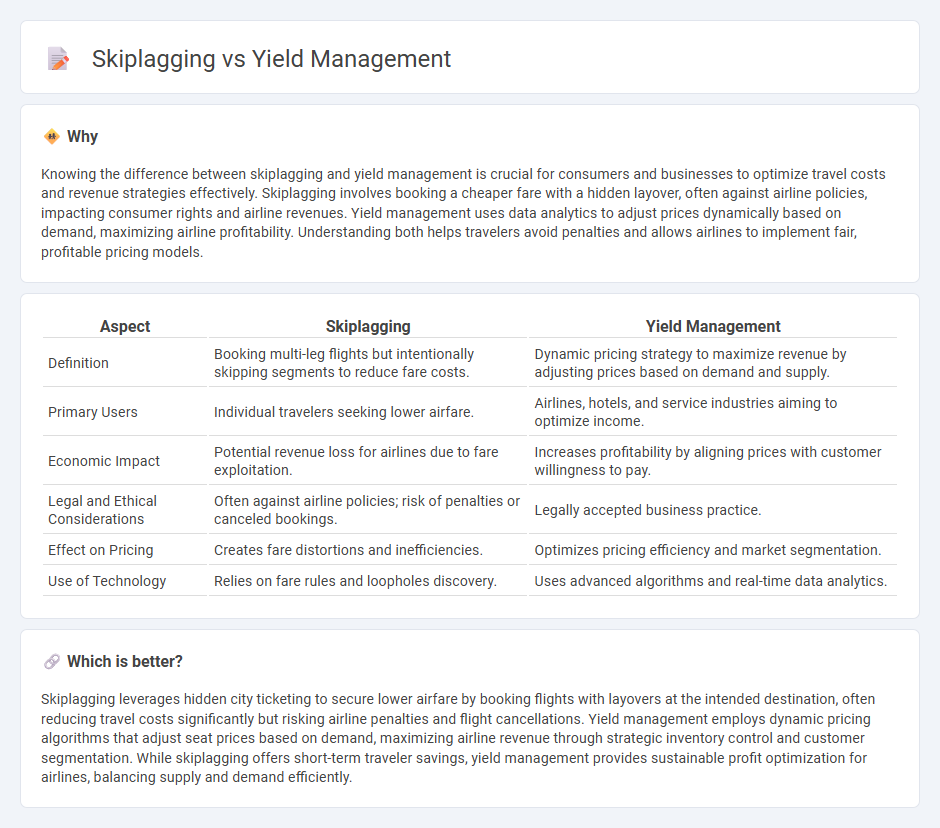
Skiplagging leverages hidden city ticketing to reduce travel costs by intentionally booking flights with layovers in desired destinations. Yield management optimizes revenue by dynamically adjusting prices based on demand, inventory, and customer behavior. Explore how these contrasting strategies impact airline economics and consumer choices.
Why it is important
Knowing the difference between skiplagging and yield management is crucial for consumers and businesses to optimize travel costs and revenue strategies effectively. Skiplagging involves booking a cheaper fare with a hidden layover, often against airline policies, impacting consumer rights and airline revenues. Yield management uses data analytics to adjust prices dynamically based on demand, maximizing airline profitability. Understanding both helps travelers avoid penalties and allows airlines to implement fair, profitable pricing models.
Comparison Table
| Aspect | Skiplagging | Yield Management |
|---|---|---|
| Definition | Booking multi-leg flights but intentionally skipping segments to reduce fare costs. | Dynamic pricing strategy to maximize revenue by adjusting prices based on demand and supply. |
| Primary Users | Individual travelers seeking lower airfare. | Airlines, hotels, and service industries aiming to optimize income. |
| Economic Impact | Potential revenue loss for airlines due to fare exploitation. | Increases profitability by aligning prices with customer willingness to pay. |
| Legal and Ethical Considerations | Often against airline policies; risk of penalties or canceled bookings. | Legally accepted business practice. |
| Effect on Pricing | Creates fare distortions and inefficiencies. | Optimizes pricing efficiency and market segmentation. |
| Use of Technology | Relies on fare rules and loopholes discovery. | Uses advanced algorithms and real-time data analytics. |
Which is better?
Skiplagging leverages hidden city ticketing to secure lower airfare by booking flights with layovers at the intended destination, often reducing travel costs significantly but risking airline penalties and flight cancellations. Yield management employs dynamic pricing algorithms that adjust seat prices based on demand, maximizing airline revenue through strategic inventory control and customer segmentation. While skiplagging offers short-term traveler savings, yield management provides sustainable profit optimization for airlines, balancing supply and demand efficiently.
Connection
Skiplagging exploits airline yield management by taking advantage of pricing discrepancies in multi-leg ticketing, where the cheapest fare is often for a hidden city stopover. Yield management systems dynamically adjust prices based on demand and booking patterns, creating opportunities for travelers to purchase lower-cost tickets through skip-leg strategies. Airlines' revenue optimization relies on detecting and mitigating skiplagging to maintain profitability in fluctuating market conditions.
Key Terms
Dynamic Pricing
Yield management uses dynamic pricing models to optimize revenue by adjusting prices based on demand, competition, and booking patterns. Skiplagging exploits airline pricing inefficiencies by booking multi-leg flights to cheaper destinations and intentionally missing the last segment, often disrupting dynamic pricing strategies. Explore more about how dynamic pricing influences airline revenue and passenger behavior.
Revenue Optimization
Yield management leverages dynamic pricing and inventory control to maximize revenue from perishable goods like airline seats, ensuring optimal seat allocation based on demand forecasts. Skiplagging exploits hidden-city ticketing by booking cheaper connecting flights and intentionally missing the final leg, which can undermine airline revenue management strategies. Explore the intricacies of these revenue optimization methods to understand their impacts and ethical considerations.
Ticket Arbitrage
Yield management optimizes airline revenue by adjusting ticket prices based on demand and booking patterns, ensuring maximum profitability through dynamic pricing strategies. Skiplagging exploits hidden city ticketing loopholes by booking flights with layovers and intentionally missing the final leg to secure cheaper fares, often conflicting with airline policies. Explore how ticket arbitrage leverages these methods for cost savings and revenue optimization by delving deeper into their mechanisms and impacts.
Source and External Links
What is Yield Management? | DealHub - Yield management is a business strategy that maximizes revenue by dynamically adjusting prices and managing inventory based on demand and market trends.
Yield management - Wikipedia - Yield management is a variable pricing approach centered on understanding and influencing consumer behavior to optimize revenue from fixed, perishable inventory.
What is Yield Management: Guide for Hotels | SiteMinder - Yield management in hotels involves adjusting room prices in response to predicted demand and market conditions to achieve the highest possible revenue.
 dowidth.com
dowidth.com